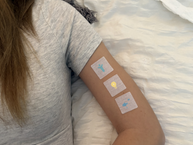Vitamin D has long been known for its role in maintaining strong bones, but its other benefits have been coming to light in recent years. It may help lower the risk for chronic health conditions and immune function disorders as well. Still, many people are not getting as much as they should. Is a Vitamin D patch right for you? Here are the facts on vitamin D so you can decide.
Benefits of Vitamin D
Vitamin D helps the body use and absorb calcium, which is why it is so important for bone health. Getting sufficient levels of vitamin D is also linked to the following benefits.
- Lower risk for type 2 diabetes, cardiovascular disease, and certain types of cancer.
- Fewer autoimmune diseases, such as multiple sclerosis.
- Lower risk for severe cases of COVID-19.
- Reduced risk of acute respiratory infections.
Getting Enough Vitamin D
Vitamin D is the “sunshine vitamin” because a healthy body can make it if with enough sun exposure. However, not everyone gets enough exposure to UV radiation from the sun to make sufficient vitamin D, or their bodies may not be able to produce vitamin D efficiently enough.. People who may not get enough vitamin D through sun exposure can include the following.
- Older adults.
- People living in a northern climate.
- People who cover their skin when they go outside.
- People with darker skin.
- People who always wear sunscreen on their face and other exposed skin when they go outside.
Vitamin D is also in some foods.
- Fortified milk, and cheese and yogurt if they are made with fortified milk.
- Some fortified milk substitute products, orange juice, and breakfast cereals.
- Fatty fish.
- Irradiated mushrooms.
- Egg yolks.
People who may not get much vitamin D in their diets can include people following plant-based diets, lactose intolerant individuals, and people who do not like milk or fish. Bariatric surgery patients, who follow a restrictive diet, may also be at risk.
Are You Deficient?
It is easy to test for vitamin D deficiency with a simple blood test that your healthcare provider can order and you can get done in a standard laboratory. If your levels are below optimal, you may need supplemental vitamin D. In that case, you and your healthcare provider can decide on the supplement that is best for you. It could be that a Vitamin D patch with Calcium or Vitamin K2 may be your best option.
Vitamin D Supplements
Oral vitamin D supplements are available in the form of capsules, chewables, or liquids. These can have the disadvantage of needing to be swallowed, and also they can lead to an upset stomach if you are sensitive to any of the ingredients in them.
Vitamin Patches allow for the transdermal delivery of vitamin D and other nutrients without needing to swallow anything or to depend on absorption in the stomach. The Vitamin D3 and Calcium Patch from PatchAid as well as the Vitamin D3 and K2 Patch both have vitamin D3, vitamin K2, calcium, and magnesium.
You can wear these patches for up to 8 hours, and use other patches while you use these. It is an effortless way to get your vitamin D3 and related nutrients! Be sure to ask your doctor about these and any other supplements you are considering, and then stop by PatchAid.com to select the best ones for your needs and your lifestyle.







